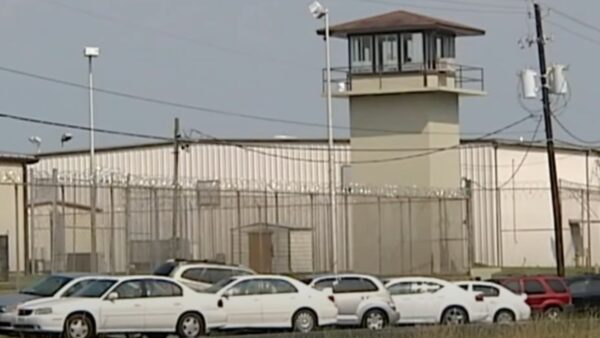A new federal lawsuit claims inmates inside Alabama prisons are the victims of a “labor-trafficking scheme” that denies them parole and forces them to work in fast food establishments.
The complaint was filed on Dec. 12, according to NPR, and includes 10 men and women as plaintiffs. The lawsuit “seeks to abolish a modern-day form of slavery” and claims the prison-forced labor scheme generates $450 million annually for the state.
Alabama Gov. Kay Ivey and Attorney General Steve Marshall are named in the suit. A beer distributor and several fast food companies, including KFC, Wendy’s, Burger King, and McDonald’s. Bama Budweiser, a distributor of Anheuser-Busch products, Gemstone Foods and Koch Foods are also defendants.

The plaintiffs claim that the restaurants and companies named in the suit received a steady supply of inmates through “convict leasing” while the prison earned percent 40 percent of the inmates’ gross earnings by deducting fees from their wages.
Roughly 20 percent of their earnings was also taken for federal and state taxes with more garnishment for medicine, doctors visits, or “high prices charged to buy a sandwich from the canteen or snack line upon returning to the ADOC facility after a long shift outside of normal eating hours.”
The lawsuit also notes that the plaintiffs are Black and are “treated like individuals who were enslaved and forced to work Alabama’s cotton fields, and those forced to participate in the sharecropping and convict leasing schemes that followed the end of the Civil War.”
The lawsuit also notes that the state incarcerates a grossly disproportionate number of Black men and women in its prisons and compares it to the racial subjugation perpetuated before and after the Civil War. According to the Alabama Appleseed Center, Black inmates account for 56 percent of the state’s prison population despite them only being 27 percent of the population in Alabama.
“Labor coerced from Alabama’s disproportionately Black incarcerated population is the fuel that fires ADOC’s extremely lucrative profit-making engine,” says the lawsuit. “ADOC enforces express rules that severely punish incarcerated people both for refusing to work and for encouraging work stoppages.”
Lakiera Walker was incarcerated in an Alabama prison from 2007 until 2023. She had a parole hearing scheduled for 2020, but it was later rescheduled for 2023. Despite her victims supporting her release, it was blocked by Alabama Attorney General Steve Marshall.
Walker was forced to work long hours stripping floors and caring for sick inmates in the prison. Walker was also forced to do roadwork in Jefferson County, where she was sexually harassed and forced to work in the freezer of a meat plant with inadequate clothing. After being so ill one day that she had to be carried to the health care unit, she was told by an ADOC job placement to “get up and go make us our 40 percent.”
Alabama State Rep. Christopher England, a Democrat representing a Tuscaloosa district, says the parole board often denies Black people parole for being threats to public safety but then allows them to work outside of prisons for several hours daily, per AL.com
“They work jobs every single day for eight to 10 hours unsupervised,” said England. “So, saying they are a threat to public safety is only a convenient excuse to deny them parole.”
“I’m out, but my heart is still there with my friends and family who have to suffer that,” Walker said of her time in prison. “They can say, ‘Oh it’s not like that, and oh, we don’t force labor, and oh, it’s OK.’ But you have so many women on the inside now that are afraid to speak out.”
Another plaintiff, Robert Earl Council, is incarcerated at the Limestone Correctional Facility in Harvest, Alabama, and is a founder of the Free Alabama Movement. Council says he has been beaten and received death threats and psychological abuse from prison guards after he advocated for inmates refusing to work.
“Alabama seems to be addicted to cheap labor,” said Council. “Those who partake in the slave process with Alabama are just as guilty as they are, each corporation, each fast food company.”
Michael Campbell is incarcerated at the Childersburg Work Release Center in Alpine and says he works five or six days a week at KFC. Campbell added that the prisoners have begun to lose hope they will ever be paroled.
“It seems like they’re not even really looking to anybody’s record,” he said of the parole board. “They’re just standing over them and denying every one of them.”
Conditions in Alabama prisons are so bad that the Department of Justice sued the state for failing to provide inmates with safe and sanitary conditions back in 2020. The complaint claimed that inside the state’s 13 men’s prisons, widespread violence and sexual abuses were prevalent.
“Alabama fails to provide adequate protection from prisoner-on-prisoner violence and prisoner-on-prisoner sexual abuse, fails to provide safe and sanitary conditions, and subjects prisoners to excessive force at the hands of prison staff.”
The forced-labor lawsuit mentions the 2020 federal lawsuit and claims inmates are in “constant danger of being murdered, stabbed, or raped.”
“The federal government has sued Alabama for inflicting cruel and unusual punishment, and if they refuse to work, the State punishes them even more,” says the complaint. “They are trapped in this labor trafficking scheme.”
The lawsuit seeks to end “coercing labor” and is requesting compensatory and/or consequential damages, punitive damages, attorney fees, and court costs.


